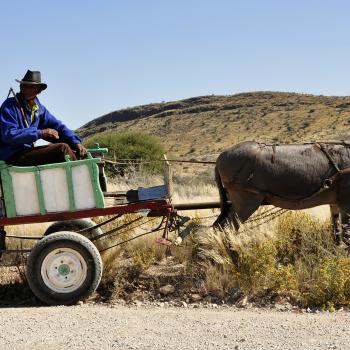This week, it’s Missie’s birthday! If she has birthdays, she can’t be a hologram, right?
Wait a minute. Did they even celebrate birthdays in the 1860s? That seems—oh! I know how to answer this question! Howard Chudacoff!
In the case of more ordinary people, birthdays were seldom celebrated before the end of the nineteenth century, both because such observance was not deemed important and because records were not always accurate or consistent enough to allow people to identify their birthdays.
And:
Diaries and memoirs form the mid-nineteenth century reveal either no recognition of birthdays or no special observance of them.
And then we get this fascinating discussion:
The journal of Agnes Lee, fifth child of Mary Custis and Robert E. Lee, refers to a birthday only once in its entries between 1852 and 1858, when Agnes was a teenager, and this reference illustrates the triviality of birthdays in the popular mind. On June 18, 1954, Agnes wrote, “This is Annie’s [her sister’s] birthday, but I suppose she has forgotten all about it.” She never mentions her own birthday. Flo Menninger, a Kansas teacher reflecting on her youth in the 1860s from the perspective of the 1930s, was conscious of her birthday; but though she elaborately described celebrations of Christmas, Thanksgiving, and even May Day, she made no mention of birthday festivities. Thus, she wrote, “On my fifth birthday, I had finished all but three patches for a quilt.” That is all; as with Anna Reed, there were no gifts, no party. The birthday was simply a means of gauging time. Lottie Spikes, recalling her childhood in Georgia in the 1960s and 1870s, failed to mention any birthday at all in her memoirs, in spite of her many descriptions of family and social events.
Howard Chudacoff, to the rescue!
If you’re anything like me, you’re wondering about Nellie Oleson’s birthday party in the Little House Books. Well guess what? I just checked the book, and Nellie Oleson’s party was not a birthday party. It was just a party. The fact that I thought it was a birthday party when it wasn’t a birthday party rather feels like confirmation of Chudacoff’s thesis. Now, Laura did go to a birthday party later, when she was 15—that would have been in 1882—and it was treated like a big deal.
According to Chudacoff, in the late nineteenth century birthday parties became something of a fashion trend among wealthy families (and those aspiring to wealth). Over time, this spread, and by the early 1900s diaries routinely mentioned birthdays—and attached them to presents and parties.
Think about it. Do the Little House books mention birthdays in any substantive way? I don’t think they do. Christmas is a huge deal throughout the books, but birthdays? Even that special gift Almonzo gives Laura before she fully realizes he’s sweet on her—wasn’t that a Christmas present?
Now yes, we’ve never confirmed the date of Love Comes Softly with any certainty, and an emphasis on Missie’s birthday would make sense if the book were set a few decades later. So let’s review! The movie was set in Montana, which wasn’t open for settlement until the early 1860s. However, the movie makes a lot of changes, so that doesn’t really tell us anything. I’ve been assuming that this book can’t take place in the 1870s or beyond, because there is no mention of trains.
I just double checked the sequels. Missie grows up and travels further west with her husband, to … somewhere. (No, really. They move to “Tettsford Junction,” but that’s not a real place and Oke never gives us a state—or province—name.) They travel there by wagon train. Then, when Marty is 42, she gets train tickets to go visit Missie for the first time since she left. This is huge! This is novel!
Marty is 19 right now. She’ll be 42 in 23 years.
The first transcontinental railroad was completed in 1869. Railroads didn’t cross the Canadian west, however, until the early 1880s, though, so this doesn’t change the time frame. If we assumed this was in the U.S., we might need to push the date for the story back to the 1850s—trains were novel in the 1870s. But if there’s some possibility this is actually Canada, the 1860s could still make sense.
The 1860s also fits, by the way, with the sewing machine—they went into mass production in the 1850s.
With that, let’s return to the book.
The next morning [i.e. Monday] at breakfast Clark informed Marty that the coming Thursday Missie would have her second birthday. Marty immediately felt concerned. She wasn’t sure how Ellen would have celebrated the event. She didn’t want to let Clark down, but how was she to know what the family chose to do about birthdays? She silently weighed the matter for the rest of the meal.
First, no, no, and no.
Second, just ask already!
Clark must have sensed her mood because he finally inquired, “Somethin’ be a troublin’ ya?”
“No,” Marty lied and remained silent for a few more minutes, then decided that would never do. If they had to share the same house, they’d just have to be frank and honest with each other—
Damn straight.
—so she blurted out, “It’s jest thet I don’t know what ya would want planned for Missie’s birthday. Do ya have company? Have a party? Do something’ different?” She shrugged. “I don’t know.”
Yep. This is all wrong.
“I see,” Clark said, and she felt he really did understand. He got up and refilled their coffee cups.
Dad-blame, Marty scolded herself, I missed thet second cup agin with my deep thinkin’.
First off, I didn’t skip anything, so the only thinking she’s doing is about Missie’s apparent need for a birthday party. In the 1860s. Second, Marty’s belief that she has to be the one to refill Clark’s coffee, when they live on a farm where everyone ought to be pitching in, is inexplicable.
Yes, Marty, as the woman of the household, would do the cooking. But she would not be expected to act as Clark’s servant. Just, weird. (Unless she had an abusive father who treated her mother that way, but nothing about Marty’s background is ever fleshed out, so that’s not what’s going on here.)
Clark didn’t appear to be bothered by it.
It’s in your head, Marty.
Anyway, Clark says they should have a cake for Missie, and that he got a “doodad in town last Saturday” that should work as a present. He says he doesn’t think they need to invite anyone.
“She’ll enjoy it as much on her own with jest”—he paused slightly and finished quickly—“jest us.”
Marty was relieved. That kind of a birthday celebration she felt she could manage.
Even that type of birthday celebration is historically inaccurate—and the fact that she was considering the possibility of much more only cements the fact that Oke was reading modern practices into the past without doing any research at all.
History isn’t just about presidents, national leaders, and wars. It’s also about cultural changes and beliefs that take place over time. And frankly, that kind of history is far more interesting.
Marty tells Clark that if she’s going to be raising Missie, she’d like to know more about what Missie was like a baby, because kids like to hear things like that. So Clark tells Marty that Missie slept through the night at three months but started teething at five months, along with a bunch of other things that seem perfectly age appropriate. He stops when he starts to get to talking about Ellen, and Marty stops him and says it’s ok, Missie should hear about her mother from him, anyway.
Which. How is that going to happen, if Marty takes Missie east with her? Is she going to ship Missie back west to see her father when she’s older? By what, wagon train?
No one is thinking this through.
Clark heads out “to see how much sod he could get turned on the land he was claiming for spring planting.” Do farmers plow in the fall as well as the spring?
Sometimes the days went too slowly for Marty, but she was relieved when she could always find work with which to fill them. What with washing, cleaning, bread baking, and meal getting, she had to look for time in which to do Missie’s sewing.
Oke finally remembered that Marty lives on a farm. She’s still working almost exclusively within doors, though. Seriously, who is doing the churning?
Is Clark feeding the chickens and gathering the eggs.
Anyway.
Marty wants to do something special for Missie, so she sets to work knitting something.
Each night she retired to her room as soon as her day’s tasks were taken care of, and with Missie sleeping soundly in her crib, the knitting needles clicked hurriedly. She must work quickly to be done in time. When she finally crawled into bed each night, she was too tired to even lie for very long and ache for Clem.
Thursday comes, and Clark is still plowing. After she puts Missie down for her nap, Marty sets to work on Missie’s birthday cake.
She felt much more confident now, having practiced with Ma’s recipes. Carefully she watched her fire on this day. It would not do to have it too hot, nor to let it die out as she so often did.
She sighed with relief when she lifted Missie’s cake from the oven. It appeared to be all that she had hoped for.
Meanwhile, Marty has started seriously fretting about Clark. See, he went out plowing again even though the day is extremely cold and windy, and it’s getting colder by the minute.
What in the world would she ever do if he took sick and needed nursing? … Why, if he went down sickles he wouldn’t know where to start on the chores. She’d never even set foot in the barn, she realized.
Seriously?! Maybe you should have thought of this earlier!
But then, we get what borders on an explanation:
Some womenfolk had to do the milking all of the time, and for that matter, some did the slopping of the hogs, too. Clark hadn’t even turned the feeding of the chickens over to her. Maybe he had expected it and she just hadn’t done so. She had been so mixed up and confused when she came to this place that she hadn’t given it a thought. Well, she’d ask. Maybe tomorrow at breakfast if the time seemed right. She was willing to do her rightful share.
Does this mean Oke does know how farms work?
Does Clark do the churning, too?
When Clark finally comes in, Marty scolds him for staying out so long in the cold and wind, and sits him down at the table with some coffee.
It was a mild scolding, but something in it seemed to tickle Clark. He smiled to himself as he crossed to the table. She could hear his good-natured complaining. “Women—honestly, one would think a man was made o’ sugar frostin’ the way they carry on.”
Hahaha gender roles and sexism, so funny!
Marty notices, when she tells Missie to “come to Mama” after she wakes from her nap, that the words don’t “seem nearly so out of place” as they seemed before. Boy, that was one long nap. Marty had time to make a cake from scratch—mixes didn’t exist back then—and bake it and take it out of the oven, on top of getting coffee and things for Clark, all before Missie woke up. Impressive.
Is this a magical cake?
After they had finished their supper, Marty went to the cupboard for the cake. Missie’s eyes opened wide in wonder, but she did not understand its meaning.
“Pwetty, pwetty!” she cried over and over.
“It’s Missie’s birthday cake,” Clark explained. “Missie’s havin’ a birthday. Missie was one,” he indicated with one upright finger, “now Missie be two.” Another finger joined the first.
No. no. no.
Thankfully, they don’t sing Happy Birthday or have Missie blow out candles. Small blessings.
Marty cut the cake and was surprised at how good ti was. As she took a bite she thought of her first effort with the biscuits. Now, thankfully, with practice and Ma’s recipes, she could turn out things she need not be ashamed of. Three weeks had made quite a difference. And Clark asked for and received a second piece of cake.
My god, baking was not that easy in the olden days. Ma clearly put a spell on the stove when she visited, because otherwise there’s no way.
Clark gives Missie a colorful, spinning top. This seems fairly realistic. Then Marty gets out her own present.
Marty knelt in front of the child and carefully fitted ’round her shoulders the small shawl over which she had labored. It was done in a soft blue, with pink rosebuds embroidered on it. Tassels lined the edge, and they seemed to especially intrigue the little girl, whose hands kept stroking them.
That was quick work.
But let’s return to the kneeling part.
Suddenly she was aware that Clark was looking at her, and there was a puzzled look on his face. Marty glanced down self-consciously and in so doing saw with horror the reason for the look. In kneeling before the child she had knelt on her skirt, pinning it down firmly so its tightness outlined her growing body.
Oops.
Marty runs off to do the dishes, leaving Clark alone with Missie. Marty’s upset. She knows she hasn’t done anything wrong, but she wishes Clark “didn’t have to know about it until it arrived.” Which isn’t reasonable, at all. But I mean—okay.
So! Recap! What did we learn this week? First, this chapter’s entire birthday theme was invented and ahistorical. Clark might have mentioned offhand to Marty that this was the day when Missie was born, but that would have been it. Second, Marty finally realizes that she ought to be helping with the farm work. And third, Clark now knows she’s pregnant.
Other things happened, too—Marty starts worrying about Clark, when he’s outside in all weather, and realizes she’s become more comfortable with him. Marty also realizes that referring to herself as Missie’s mama no longer feels so odd. For his part, Clark notices that Marty is increasingly stepping into her role, both as his wife and as Missie’s mother. They’re both becoming more comfortable with each other. And they’re actually starting to communicate a little bit better, too.
Honestly, I don’t find Clark and Marty’s relationship particularly interesting. They’re going to get more comfortable with each other; they’re each going to realize that the other isn’t half bad; they’re going to start to rather like each other; and eventually, they’re going to conclude this is love.
I’d rather hear more about Sally Anne and Laura.
I have a Patreon! Please support my writing!















